Death in Oslo Read online
Page 6
‘I mean the President, Madam President. And I’m sure you’re wondering why. Why? Why on earth should the President embark on her first foreign visit with such limited protection from her own people?’
His audience did not appear to be pondering the question. Quite the opposite: the conversation up until that moment had focused on the overwhelming number of American agents, who were now knocking on doors, going into offices, confiscating equipment and generally making life difficult for the Norwegian police.
‘Because – it – is – safe – here.’ He said the words with an exaggerated delay. Then he repeated: ‘Because Norway is safe. We thought. Look at us.’ He hit himself gently on the chest. ‘The whole thing is absurd,’ he repeated quietly. His listeners were more attentive now. ‘Nothing more than an intestine on this map, this . . .’
He surveyed the map of the world. The corners were worn. The word Yugoslavia was written in bold letters across the Balkans; Peter Salhus shook his head.
‘Good old Norway,’ he said, and stroked his country with his finger, from north to south. ‘For many years now we’ve talked about what a colourful society we are and what a multicultural country we’ve become, and allowed ourselves to be lulled into a sense of security, peace, innocence – that we were somehow different. We’re always saying that the world is pressing in on us from all sides, yet at the same time we get extremely offended if that very same world doesn’t see us in exactly the same way that we have always perceived ourselves to be, as an idyllic place on earth. A peaceful corner of the world, rich and generous and kind to everyone.’
He bit a piece of dry skin on his lip.
‘Right now we’re caught up in a powerful and terrible head-on collision, I want you to realise that. This country is prepared for disasters to the extent that anyone can be prepared. We are prepared for epidemics and other catastrophes. Some people even believe that we are prepared for war . . .’ He smiled vaguely at the Minister of Defence, who did not smile back. ‘But what we were not prepared for in any way was this. What’s happening now.’
‘Which is?’ asked the Director of Police, with a sharp edge to her voice.
‘That we have managed to lose the American president.’
The Minister of Justice made an inappropriate noise that sounded like a stifled giggle.
‘And they simply will not accept that,’ Salhus continued, unperturbed. He went back to his chair. ‘It’s true that the Americans have lost one or two presidents through assassinations, but they have never, not even once, lost a president on foreign soil. And you can be certain of one thing . . .’ He sat down heavily. ‘Every single one of those Secret Service agents who are now buzzing around making life difficult for our staff will take this personally. Very personally indeed. This happened on their watch, and they don’t want that pinned on them. For them, that would be worse than . . . For them this is . . .’
He hesitated, and the Prime Minister managed to cut in with a question. ‘Who . . . who can we actually compare them with?’
‘No one.’
‘No one? But it’s a police force and—’
‘Yes, but they have a number of other tasks as well. The bodyguards are, if you like, the identity of the service, and have been ever since President McKinley was assassinated in 1901. And that identity has been seriously threatened by what happened last night. Not least because it’s due to a big mistake. One that they themselves made.’
The Minister of Justice’s body was still shaking, but there was no sound. This time no one used the pause to ask questions.
‘They made an error of judgement,’ Peter Salhus said. ‘A gross error. We’re not the only ones who think of this country as a peaceful corner in a big bad world. The Americans do too. And the most worrying thing about it, apart from the fact that the President has simply vanished, is that the Americans actually thought it was safe here. They are in a far better position to assess that sort of thing than we are. And they should have known better, as—’
‘As they have far more intelligence,’ the Director of Police chimed in.
‘Yes.’
‘I see,’ said the Prime Minister.
‘Exactly.’ The Minister of Justice nodded.
‘Yes,’ Peter Salhus said again.
Then there was silence. Even the Minister of Justice left his cup of coffee in peace. The plasma screen on the wall shone a uniform blue and told them nothing. The neon strip light on the ceiling had started to blink, off beat and without a sound. When a fly broke the silence with a lazy buzz, Peter Salhus followed it with his eyes until the silence started to feel uncomfortable.
‘The Americans have absolutely no idea what is happening,’ the Prime Minister concluded.
He gathered the papers in front of him into a pile, without indicating that the meeting was over.
‘I mean, they don’t either.’
‘I would perhaps say that they had no idea,’ Salhus corrected, with some hesitation. ‘Beforehand, I mean. The challenge for them now is to sift through all the material that they have at any given time. To lay their cards on the table in a different way and see what emerges.’
‘But the problem is,’ the Director of Police said, swatting at the fly, which had come a bit too close, ‘that they have too many cards.’
Salhus nodded. ‘You can’t even begin to imagine,’ he said. His eyes felt dry and he chewed at this thumb. ‘It’s hard for us to comprehend all the information they have. And that they receive all the time, every minute, every hour, every day. The FBI has multiplied in both size and budget since nine/eleven. From being a relatively traditional police organisation with clear professional and largely internal American responsibilities, the greater part of its budget and staff are now earmarked for anti- terrorist activities. And this, ladies and gentlemen . . .’
He picked up an official portrait of Helen Lardahl Bentley from the table.
‘Kidnapping a president definitely falls under the category of terrorism in the US. They will come storming over here, be sure of it. As I said, a number of FBI people are probably already here with the President. But we ain’t seen nothing yet.’
He gave a feeble smile and ran his finger round his collar while absently staring at the photograph of the President.
‘According to my reports, a special flight is in fact due to land in three hours’ time,’ the Director of Police confirmed. ‘And there are more scheduled to arrive after that.’
The Prime Minister traced his finger over the top of the table. He stopped at a spot of coffee. Two deep furrows could be seen in the folds of skin on his face, and it was only the light reflecting on his glasses that indicated that there was a pair of eyes there too.
‘Yes, but we’re not talking about an invasion,’ he said, obviously irritated. ‘You make it sound as if we’re completely at the mercy of the Americans, Salhus. And let me reiterate . . .’ he raised his voice a notch or two, ‘that this has happened on Norwegian soil. We will of course spare no effort or money and the Americans will be treated with the utmost respect. But this is a Norwegian case, to be dealt with by the Norwegian police and legal system.’
‘Good luck,’ Peter Salhus muttered, and rubbed his forehead with his knuckles.
‘I will let nothing of the sort . . .’ The Prime Minister paused and raised his glass to his mouth. His hand was shaking and he put the glass down again without drinking any water. Before he had a chance to continue, the Director of Police leant over the table.
‘Peter, what do you actually mean? That we should leave the whole puzzle to the Americans? Give up our sovereignty and jurisdiction? You can’t be serious!’
‘Of course I don’t mean that,’ Salhus replied. He seemed surprised by her familiarity and hesitated a bit. ‘I mean that . . . I in fact mean the opposite. All our experience – political, professional and for that matter military – means that we have a huge advantage over the Americans in this case.’
Someone knocked on the door and a red
light flashed by the door frame.
No one reacted.
‘We are Norwegian,’ Peter Salhus said. ‘We know this country. We know the language. The infrastructure. The geography, the topography. The architecture, the town. We are Norwegian and they are American.’
There was another knock at the door, more agitated this time.
‘We’ve started,’ Salhus continued and shrugged. ‘Things are working. We’re all here, everyone who should be here. The contingency plans work. Staff have been called in. The machinery was started up hours ago, in all the ministries. The Ministry of Foreign Affairs and the Storting are taking responsibility for protocol at the moment. My point is just that—’
He stopped when a round middle-aged woman came into the room. She silently placed a piece of paper in front of the Prime Minister, who made no attempt to read it. Instead, he nodded to Salhus. ‘Carry on,’ he said curtly.
‘My point is that we have to understand what we are dealing with. We can have no illusions that the Americans will be happy to take instructions in a situation like this. They will overstep the mark, again and again. At the same time, we have to acknowledge that they have qualifications, equipment and intelligence that will be essential for the case. To put it simply, we need them. The most important thing will be to convince them that . . .’ He lifted his glass and looked at it, distracted. The fly had settled on the inside and was attempting to open its wings, feeble and half dead. ‘That they need us just as much,’ he said emphatically, turning the empty glass in his hands. ‘If not, they’ll bulldoze us. And if we are going to achieve mutual understanding and trust, then I think we should stop banging on about words like jurisdiction, territory and sovereignty.’
‘Which is more or less what Vidkun Quisling must have said,’ the Minister of Justice objected, ‘in April 1940.’
The silence that followed was almost deafening. Even the fly had capitulated and lay with its legs in the air at the bottom of the glass. The Prime Minister’s incessant rummaging in his papers stopped abruptly. The Director of Police sat bolt upright in her chair, without leaning back. The Minister of Foreign Affairs, who had barely said a word throughout the meeting, sat petrified, with his mouth open.
‘No,’ Peter Salhus said eventually, and so quietly that the Prime Minister on the other side of the enormous table nearly missed it. ‘It is not. It is not in any way the same.’
He was stiff and slow when he got up.
‘I assume that this meeting is over,’ he said, without looking at the Prime Minister.
Salhus walked over to the door. He held his documents loosely in his hand, and looked at no one. They were all staring at him. As he passed the last chair before the door, the Prime Minister put a conciliatory hand on his arm.
‘Thank you for your efforts so far,’ he said.
Salhus did not reply.
The Prime Minister didn’t take his hand away.
‘You . . . you really admire these FBI people.’
Peter Salhus couldn’t understand what the man wanted. So he didn’t answer.
‘And these Secret Service agents. You really admire them, don’t you?’
‘Admire.’ Peter Salhus said the word slowly to himself, as if he wasn’t quite sure what it meant. Then he reclaimed his arm and looked the Prime Minister straight in the eye.
‘Perhaps, yes.’ He nodded. ‘But first and foremost . . . I fear them. And so should you all.’
He left the government’s secret crisis meeting with the faint smell of decay in his nostrils.
VIII
The young man at the petrol station was thoroughly pissed off. It was the second year in a row that he had had to work on the 17th of May. OK, so he was only nineteen and the youngest employee, but it just wasn’t fair that he should have to die of boredom at work on a day when practically no one needed petrol. And not many people would come to buy hot dogs either, as the station was too far from the centre of town. They should just close the damn place. If anyone was desperate for fuel, the card-payment-only pumps were still available.
‘Junior’ll do it,’ the boss had boomed when they were arguing about shifts a couple of weeks before.
Junior’ll do it. As if the boss was his dad or something.
Two boys of about ten came running in. They were wearing maroon band uniforms, black hats and white patent-leather bandoliers. They had obviously left their drums somewhere and were fencing energetically with their sticks.
‘En garde,’ one of them shouted and made a hit.
‘Ow! That hurt!’
The smaller of the two dropped his drumsticks and clutched his shoulder.
‘Stop making such a racket,’ the assistant said. ‘You going to buy anything, or what?’
Without saying anything, the two boys rushed over to the freezer. It was a bit too high for them. One of them used the shelf with chocolates on it as a ladder.
‘Cornetto,’ screamed the other.
‘Leave it out.’ The assistant hit the counter.
The cheeky bugger who had climbed on the shelf was an Asian.
They could camouflage themselves in band uniforms and national costumes if that was what they wanted. They were still bloody foreigners. It was really pathetic the way they tried to Norwegianify themselves. Earlier that day a whole flock of little black kids had come in. They’d chatted and made a noise and took over the whole shop, as if they were at home in Tamil-land or Africa or wherever they came from. And they didn’t buy much. But they were all wearing 17th of May ribbons. Great red, white and blue ribbons on their jacket collars and Salvation Army coats. Grinning and laughing and ruining the national day for everyone else.
‘Hey, you!’
The assistant came out from behind the counter and went over to the boys. He took hold of the Paki by the scruff of the neck.
‘Drop the ice-cream.’
‘I’m going to pay for it! I was going to pay!’
‘Drop the bloody ice cream!’
‘Ow, that hurts!’
His voice wasn’t as cocky now. The assistant could have sworn the kid was about to cry. He let go.
‘Hi.’
A man came in. He stood for a moment looking askance at the two boys. The assistant mumbled hello.
‘Sorry to park right up by the window,’ the man said and nodded towards a blue Ford on the other side of the glass. ‘I didn’t see the sign until I was out of the car. I just want some mineral water, so . . .’
The assistant lifted his chin in the direction of the fridge and returned to his place behind the counter. The younger of the boys, his blond hair curling out from under his hat, slapped a fifty-krone note down in front of him.
‘Two ice creams,’ he hissed through gritted teeth. ‘Two Cornettos, you creep.’
The man from the Ford came up behind him. The boy took his change without a word and turned away. Then he held one of the ice creams out towards his friend, who had sought refuge by the door.
‘Dickhead!’ they chorused as the door closed behind them.
‘Three mineral waters,’ the man said.
‘You paying by card?’ the assistant asked, curtly.
‘No. Here.’
The man took his change from the one-hundred-kroner note and stuffed it in his pocket.
The assistant glanced over at the car. It was parked so the driver’s seat was right up by the window, less than a metre away. He thought he saw someone in the passenger seat, a thigh, and a hand that reached out for something. There was a woman in the back, sleeping. Her head was leant against the window. Her jacket had somehow got caught around her shoulders and it made the angle of her neck look unnatural. The skin on her neck was almost as red as the jacket.
‘Bye, thank you,’ said the man. He pulled his cap down over his forehead and disappeared out the door.
Bloody 17th of May. It was almost four o’clock. At least his shift would be finished soon, if the boss bothered to turn up, that is. You never knew. What a crap day.
/>
He took his time, dropped the sausage into a roll, then covered it with prawn mayonnaise, relish and loads of mustard before wolfing it down.
It was his ninth hot dog since the morning, and it didn’t taste good.
IX
‘The palace is just up there,’ Ambassador George A. Wells said, and nodded towards the park on the other side of Drammensveien. ‘And it’s not just a monument, they actually live there. The royal family. Nice people. Very nice people.’The men looked quite similar, standing as they were with their backs to the room, looking out over the street behind the fortifications that surrounded the triangular building. They might easily be mistaken for brothers. The ambassador had to put up with his wife nagging him daily about losing some of the extra pounds round his stomach. But the two men standing in front of the window of the American Embassy in Oslo, watching the Norwegian people celebrate in all their finery on the other side of the aggressive metal barriers, both took their food and golf very seriously. And they both looked good on it. George Wells was nearly seventy, but was still blessed with thick silver hair. His guest was younger and had the same thick hair, though not as well groomed. They both had their hands in their pockets. Their jackets had been abandoned long ago.
‘The royal family appears to be less well protected than we are,’ the guest said, and pointed towards the park around the palace. ‘Anyone can walk right up to the palace.’
‘Not only can, but do. The endless parade they have every year to mark the seventeenth of May passes right under the balcony where the royals stand waving to the crowd. There’s never been a problem. But then they . . .’ he gave a wan smile and ran his fingers through his hair, ‘are a bit more popular than us.’
Neither of the men said anything for a while. They looked down at the street, where it was difficult to tell whether people were coming or going. Suddenly, and at the same time, they both caught sight of a little boy with an American flag. He was probably about five or six years old and was wearing dark blue trousers and a bright red V-neck sweater with a white T-shirt underneath. He stopped and looked up. There was no way that he could see them; he was too far away, and the smoked windows made it impossible to see in. He smiled all the same and timidly waved his flag. His mother turned round and grabbed him by the arm, irritated. The boy carried on waving until he was out of sight.

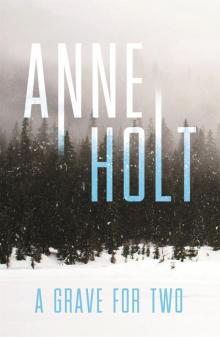 A Grave for Two
A Grave for Two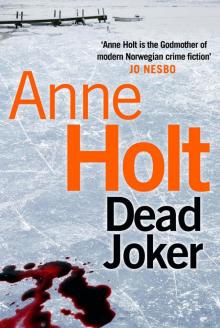 Dead Joker
Dead Joker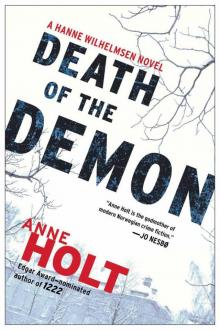 Death of the Demon: A Hanne Wilhelmsen Novel
Death of the Demon: A Hanne Wilhelmsen Novel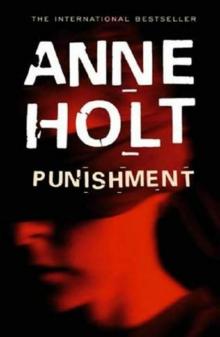 Punishment aka What Is Mine
Punishment aka What Is Mine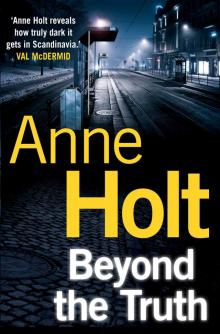 Beyond the Truth
Beyond the Truth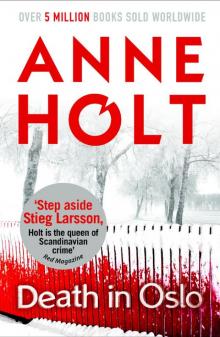 Death in Oslo
Death in Oslo The Blind Goddess
The Blind Goddess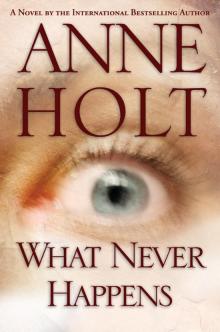 What Never Happens
What Never Happens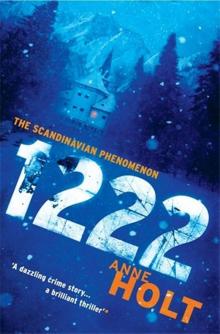 1222
1222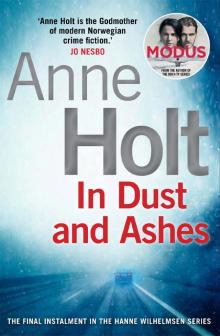 In Dust and Ashes
In Dust and Ashes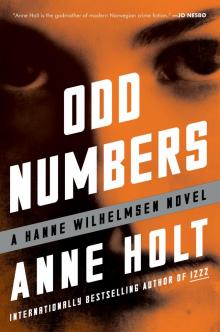 Odd Numbers
Odd Numbers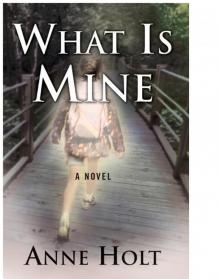 What is Mine
What is Mine What Dark Clouds Hide
What Dark Clouds Hide Blessed Are Those Who Thirst
Blessed Are Those Who Thirst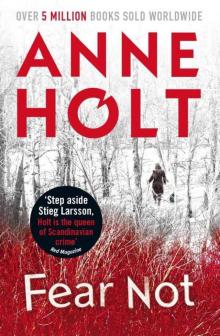 Fear Not
Fear Not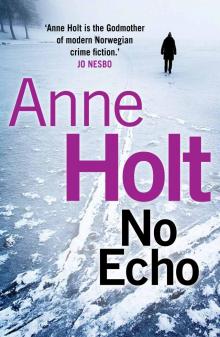 No Echo
No Echo Hanne Wilhelmsen - 01 - The Blind Goddess
Hanne Wilhelmsen - 01 - The Blind Goddess